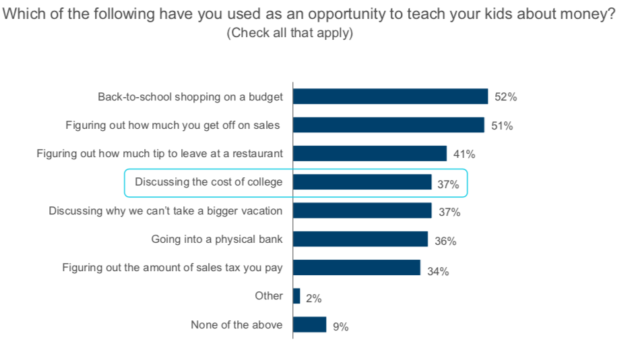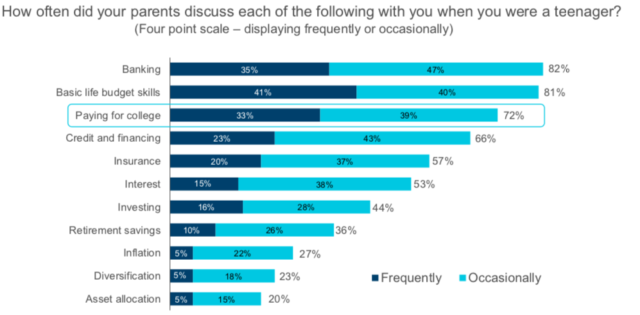A New Stock Market Game that Rewards Patience and Diversification
November 6, 2018
September 26, 2018

Families are feeling better about their ability to pay for college, new research shows. This is partly due to more systematic saving. But common sense seems to be playing a role too.
College 529 savings plans, which grow tax-deferred, are now the most popular way to put away money for school, according to the T. Rowe Price Parents, Kids & Money Survey. Some 44% of families save this way, up from 27% two years ago, when regular bank savings accounts with no tax advantages topped the list.
Fewer parents are raiding dedicated college savings for other purposes, according to the survey. Hallelujah. Meanwhile—and here comes the common sense—a whopping 74% of parents say they would send their kids to a less expensive school to avoid loans, up from 62% last year.
These are encouraging trends that financial educators should consider drawing on in the classroom. As more families openly discuss college costs at home, and adjust their thinking, educators enjoy greater entrée to a critical area of study—one that is still sorely lacking in most kids’ school experience.
Only 24% of young adults had a stand-alone course in personal finance while in school, the survey shows. Another 33% had some personal finance instruction as part of another course. Together, these lessons were heavily tilted toward simple banking and budgeting concepts. Less than half of the coursework touched on education debt. And if you are looking for a real blind spot, just 13% of the courses discussed diversification and asset allocation.

Make no mistake: money talk at home coupled with lessons at school makes a big difference. Young adults who spoke about money with their parents as children are more than twice as likely to save for their own kids’ college education, the survey found.
These trends are allowing parents to sleep better at night. Only 27% of parents report losing sleep over college costs, compared with 41% last year, according to the survey.
One reason that parents feel better about paying for college is they have gotten real about the burden of student loans and lowered the cap on what they are willing to spend or borrow. Parents willing to take on more than $75,000 in student debt have fallen to 14% from 28% two years ago, the survey found.

An earlier survey from Fidelity adds texture to this finding. It also revealed that parents are saving more for their kids’ college costs but suggests that parents feel they are tapped out and have drawn a line in the sand. Going forward…
• • •
…they expect their kids to shoulder more of the expense.
The average parent of a high school sophomore expects their child to have set aside $15,385 for college by high school graduation—up from $12,431 two years ago, Fidelity found. Just 49% of parents feel it is their obligation to foot the entire college bill—down from 56% two years ago, according to that survey.
Student loan wariness is at such high levels that parents are placing stricter limits on the amount they will allow their kids to take on. Some 20% now prohibit any debt at all, up from 17% last year. “This speaks to the increased sensitivity parents have to the consequences of education debt and the long-term effect it can have on both their and their children’s lives,” says Stuart Ritter, senior financial planner at T. Rowe Price.
The survey also found that more parents are using the cost of college as a teachable moment to discuss money with their kids. More than a third do so, ranking just behind back-to-school budgets, shopping for sale items, and calculating a tip as top teachable money moments.
Why the Blame for Extreme Student Debt is Shifting
This State Sees Student Debt as Gateway to Financial Literacy
Student Loan Payback Assistance Will Be the Next Big Benefit
The Next Big Thing in Workplace Financial Education: Help with Student Debt
The Surprising Amount That Parents Secretly Expect Their Kids to Pay for College
Posted in Latest Research, Youth on September, 2018
Sign Up to receive the Right About Money Report
Sign Up to receive the Right About Money Weekly Digest
|
Tired of Your Cubicle? Try a Trade Read More |
|
What Monkeys Can Teach Us About Money Read More |
|
Maryland bills call for financial literacy courses in schools, prisons Read More |
|
England faces ‘crisis’ in adult financial literacy Read More |
|
How to explain to a child when you can’t (or don’t want to) buy something Read More |
|
The future of financial education Read More |
|
CFPB issues fifth Financial Literacy Annual Report Read More |
|
Arkansas Schools To Teach Financial Literacy Read More |
|
Eureka! to foster STEM education for girls in Pittsfield Read More |
|
Money on the mind: Personal finances a major stressor for many Canadians Read More |
|
How Nostalgia Can Help You Save Money Read More |
|
Financial literacy topping Treasurer Fitch’s platform Read More |
|
Apps to make your kids smart about money Read More |
|
Study reveals how personal keepsakes can help you save money Read More |
|
Personal finance seen as big gap in Mass. education landscape Read More |
|
UK investors feel let down over financial education Read More |
|
State senator pre-files financial literacy bill Read More |
|
Missouri financial literacy programs promote importance of loan repayment Read More |
|
Visa launches interactive financial literacy-themed play Read More |
|
AI is disrupting the labor market. Here’s what educators need to know Read More |
|
Missouri adopts revised personal finance standards for students Read More |
|
94% of Americans failed this financial quiz—here are the 4 hardest questions Read More |
|
Child’s higher education more important than retirement saving for Indians: Survey Read More |
|
India moves closer towards achieving its goal of financial inclusion Read More |
|
Cashless kids: Is tap-and-go technology promoting financial illiteracy? Read More |
|
Young Adults Say Financial Literacy Offers More Benefits than Other High School Subjects Read More |
|
Fiji Ministry of Education takes up stewardship of Financial Education Program Read More |
|
Why everyone’s racing to help us know more about money Read More |
|
‘Financial capability’ should be part of school curriculum says Retirement Commissioner Read More |
|
The Simple Reason Millennials Are Saving More for Retirement Read More |
|
Dodgers and unlikely teammates help local kids hit a home run Read More |
|
Biz Kid$ financial education TV program returns for Season 6 Read More |
|
Why Law School Students Need a Financial Education, Too Read More |
|
Habitat NZ looks to build financial literacy in Samoa Read More |
|
Why there needs to be a ‘financial fitness revolution’ Read More |
|
Regulators in India team up for financial inclusion Read More |
|
Regent universities will ask new students to complete online financial literacy course Read More |
|
How parents can prepare children to handle wealth after inheritance Read More |
|
Prudential Cambodia achieves major milestone Read More |
|
Older Women Flunk Financial Literacy Quiz Read More |
|
Some different advice for this year’s graduates Read More |
|
3 biggest money mistakes you’re teaching your kids Read More |
|
More Australian students to benefit from new funds for financial literacy Read More |
|
Two Surveys Reveal Financial Literacy, Behaviors of Millennials and Gen Z Read More |
|
Sabah lauds move to raise financial literacy Read More |
|
New Florida law requires colleges to spell out student debt Read More |
|
Creating capacity and capability in India’s wealth sector Read More |
|
Stash Secures $40M in Funding to Meet Demand for Its Financial Education Platform Read More |
|
Use summer break to teach your children about finances Read More |
| Read More |
|
Companies offer “financial wellness” programs as a job perk Read More |
|
Equifax and Junior Achievement Americas Expand Financial Inclusion Program in Latin America Read More |
|
Chauncey Billups serves Denver youth as rumors with Cavs swirl Read More |
|
Financial literacy can lower political cost of pension reform Read More |
|
Why It Pays To Start Financial Education Early Read More |
|
Ask an Attorney: How can I teach my child about finances? Read More |
|
Most of us are overconfident about our financial knowledge – that’s a risk Read More |
|
Why does China top the ranking in financial literacy? Read More |
|
House subcommittee hearing looks at impact, opportunities of fintech Read More |
|
Why India needs to work on financial literacy now more than ever Read More |
|
Education system overhaul should include new emphasis on financial literacy Read More |
|
ARE YOU EMBRACING THE 4 C’S OF FINANCIAL LITERACY? Read More |
|
Survey Shows Those Working WIth Advisors Less Financially Literate Read More |
|
NBA Philippines draws up new gameplan for financial planning Read More |
|
Dollars and sense: Canadian teens rank among highest internationally in financial literacy Read More |
|
Atomic Weapons Establishment launches online financial education program Read More |
|
High school seniors learn how to save now so they can spend later Read More |
|
USAA Invests Nearly $2 Million in STEM, Financial Literacy Hub Read More |
|
Ontario elementary students MUST get financial literacy lessons too Read More |
|
Students learn financial literacy with lemonade Read More |
|
Why technology is key to financial wellness success Read More |
|
Rural financial education project launched in Beijing Read More |
|
Canadians Share What They Wish They Learned About Money Read More |
|
Too Many Products, Not Enough Education Hampers Financial Wellness Plans Read More |
|
48% say financial education would help them save for retirement Read More |
|
High schoolers can now earn a $1,000 scholarship for completing a free financial literacy course Read More |
|
Encourage financial literacy by speaking to clients’ emotional priorities Read More |
|
SHIFTING FROM FINANCIAL EDUCATION TO FINANCIAL CAPABILITY Read More |
| Read More |
|
Raise your financial literacy and become a banking guru Read More |
|
study shows students want better financial information sooner Read More |
|
Is It Racist to Teach Students Financial Literacy Read More |
|
New Charity Makes Financial Education Accessible to Everyone Read More |
|
7 Steps Toward Financial Literacy For Your Children Read More |
|
Portugal to boost financial literacy of football players Read More |
| Read More |
|
How Financial Knowledge Drives Wealth Inequality Read More |
|
Investment Platform Stash Reveals Findings from First Financial Literacy Survey Read More |
|
Kerala Gramin Bank reaches out to schools with financial literacy agenda Read More |
|
Only 24% of irish people believe they are financially savvy Read More |
|
What Makes Workplace Financial Education Work? Read More |
|
Professors give themselves a ‘B’ in financial literacy Read More |
|
Lack of Financial Literacy Costs Americans over $9,700 across their Lifetimes Read More |
|
As More Women Become Leaders, Financial Literacy Is a Key Ingredient Read More |
|
New Personal Finance Index Identifies Gaps In Financial Literacy Among American Adults Read More |
| Read More |
|
BANZAI, 10,000 YEARS OF FINANCIAL LIFE Read More |
|
‘Is that a want or a need?’ Financial literacy starts in 4th grade Read More |
|
Lawmaker says NJ school kids should learn about student debt Read More |
|
Financial Mistakes We Can Avoid If We Learn About Money Earlier In Life Read More |
|
Financial literacy essential for growing generations Read More |
|
Law would require Nevada schools to teach financial literacy Read More |
|
Students struggle with financial literacy amidst rising costs Read More |
| Read More |
|
Advisers not best to teach financial literacy, ASIC says Read More |
|
Florida Lawmakers: High Schoolers Need More Financial Literacy Read More |
|
Financial literacy paradox: Banking curriculum Read More |
|
Are UK employees crying out for financial wellbeing training? Read More |
|
The Future Of Financial Education: The Financial Sector Needs To Step-up Read More |
|
RBI asks Financial Literacy Centres to hold special camps on going digital Read More |
|
Past-Due Medical Debt, Partially Linked to Financial Literacy, Has Declined Read More |
|
BUILDING FINANCIAL LITERACY IN HIGH SCHOOL SO KIDS DON’T RACK UP HUGE COLLEGE LOANS Read More |
|
Helping financial educators pave the road to higher credit education in Mississippi Read More |
|
Campaign aims to increase money-management skills Read More |
|
New Finance Center at HSSU Aims to Address Financial Literacy Read More |
|
BUSINESSES MUST SUPPORT FINANCIAL EDUCATION IN SCHOOLS Read More |
|
Treasurer Fitch Pushes Gender Pay, Financial Literacy Despite Bills Dying Read More |
|
Wealth Inequality and Financial Education during the Trump Administration Read More |
|
Hong Kong’s Inaugural Money Month Launched Read More |
|
Designing an Effective Financial Literacy Program Read More |
|
Military personnel speak up for beleaguered consumer agency Read More |
|
$2M donation will create financial education center in Bismarck Read More |
|
Director Richard Cordray Remarks at Financial Literacy and Education Commission Read More |
|
Courage, not Literacy, Key to Financial Wellness Read More |
|
Questioning the Value of Financial Education Read More |
|
4 in 5 financial advisers in Australia willing to volunteer coaching financial literacy Read More |
|
Quebec high school finance course ‘concocted by the banks,’ according to unions Read More |
|
Junior Achievement Worldwide Launches A Version In Ghana Read More |
|
Colorado Attorney General launches FinLit program at Mountain View Core Knowledge Read More |
|
Lack of financial literacy a setback Read More |
|
Schwab to Fund Matching Donations for Financial Literacy Projects in Public Schools Read More |
| Read More |
|
Student Investing Championship Launched to Find Best University Student Talent Read More |
|
Our Grandparents Learned Personal Finance in School. Why Can’t Our Children? Read More |
|
Kiss-A-Pig secures a $5300 grant for local High School Read More |
|
Miss Auburn Candidate Promotes Financial Literacy Read More |
|
Being money smart with your sweetheart Read More |
|
Ghana bank promotes financial literacy through Monopoly Read More |
|
How to help distressed employees during tough financial times Read More |
|
Larry Fink calls on CEOs, money managers to teach financial literacy Read More |
|
Iowa Lawmakers to Consider Mandatory Financial Education Read More |
|
Students Become Bank Tellers in This Iowa City Read More |
November 6, 2018
September 26, 2018
September 19, 2018
September 12, 2018
September 27, 2017
February 28, 2017
October 4, 2017
November 6, 2016






